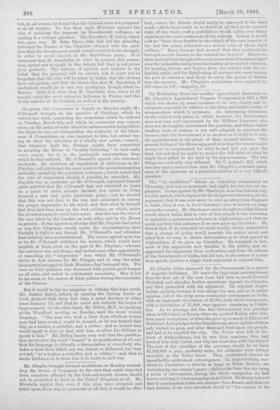On Wednesday there was another agricultural discussion on Mr. Chaplin's
Agricultural Tenants Compensation Bill, a Bill which was shown by many speakers to be very clumsy and in- adequate, especially in relation to the three alternative modes of compensation which it proposes. Au interesting discussion ou the subject took place, in which, however, the Government were not very well represented by Sir William Harcourt, who does not thoroughly understand the question, and whose rather chaffing style of oratory is not well adapted to convince the farmers that the Government is as anxious as it really is to help the agriculturists in the pinch of their present distress. The general feeling of the House appeared to be that the tenant ought always to be compensated for what he had laid out upon the land, but not that he ought to receive the full value of what he might have added to the land by his improvements. The two. things are evidently very different. Sir T. Acland's Bill, which was also read a second time with Mr. Chaplin's, contains many more of the elements of a practical solution of a very difficult question.


































 Previous page
Previous page